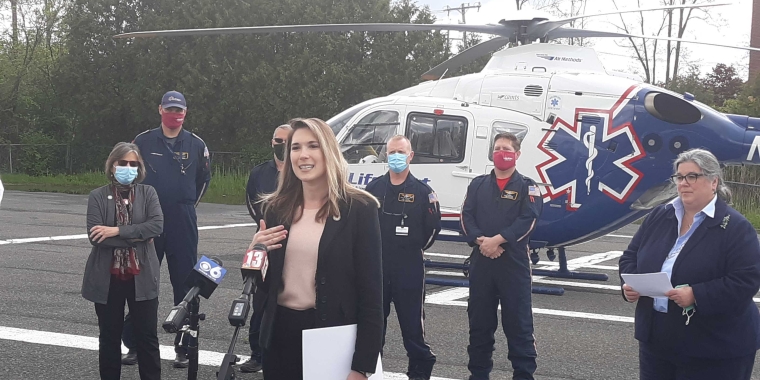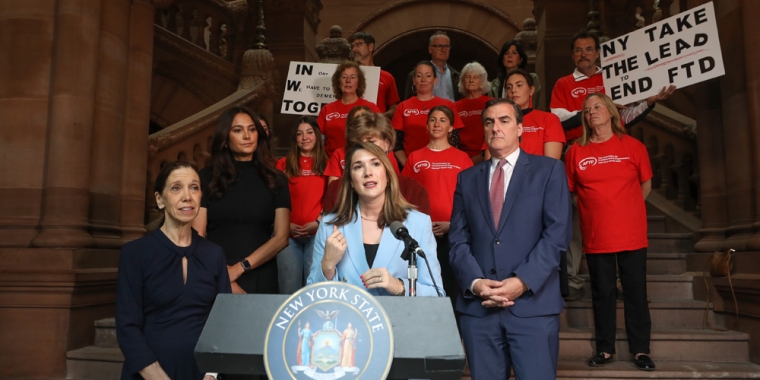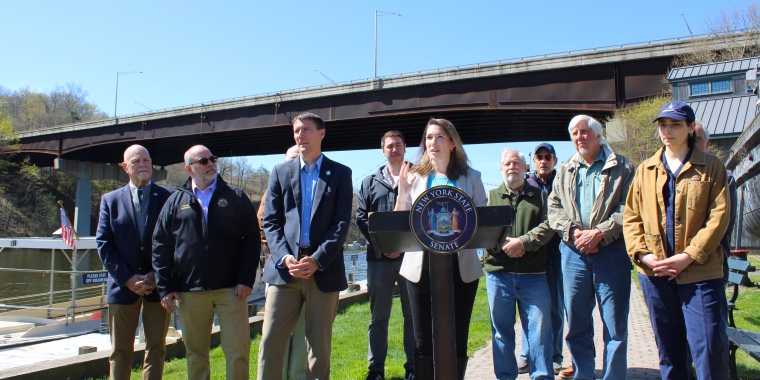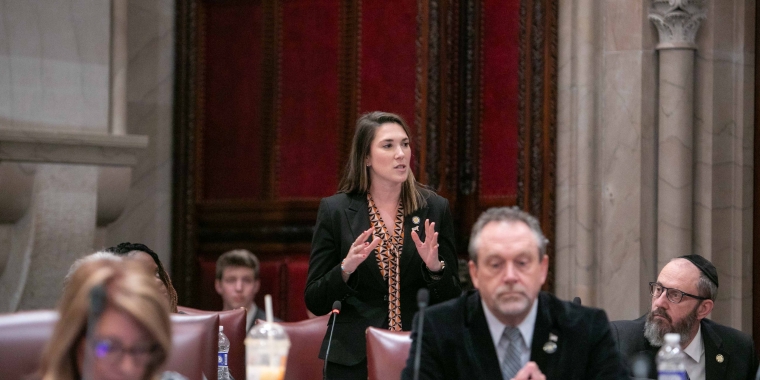
Senator Michelle Hinchey Pushes to Advance Life-Saving Air Ambulance Legislation
May 10, 2021

ALBANY, NY – Today, State Senator Michelle Hinchey (SD-46) joined Assemblymember Carrie Woerner (AD-113), LifeNet of New York, and emergency personnel at the Albany Medical Center Heliport to rally support for legislation (S4085/A2561) introduced by the state legislators that would allow air transport ambulance providers to carry and distribute blood products to patients at the scene of an emergency, amending an outdated state law that severely restricts this live-saving care.
New York is the only state that does not allow aeromedical crews to carry and transfuse blood unless they are transporting patients already receiving transfusions from one hospital to another. Currently, in New York, patients in hemorrhagic shock and other trauma patients being transported from an emergency must wait until they reach a hospital to receive a transfusion.
“In a medical emergency that requires air transport, access to a blood transfusion can mean the difference between life and death, especially for residents in our rural communities where the nearest trauma center may be hours away,” said Senator Michelle Hinchey. “New York is currently the only state in the country that does not allow medical helicopters to carry and transfuse blood, despite the fact that our air ambulance crews are trained to perform this life-saving care. For the safety of our rural and upstate communities, and New Yorkers everywhere, we need to reverse this dangerous statute by passing our bill with Assemblymember Carrie Woerner, which will give our first responders the tools they need to continue saving lives.”
Assemblymember Carrie Woerner said, “Right now, if a person in New York experiences a severe illness or injury such as a life-threatening car accident they can’t receive a transfusion until they arrive at a hospital. In cases severe enough to require helicopter transport to a medical facility it makes sense to allow a transfusion in what could be a life saving window of time. When minutes matter, seconds can make a difference.”
Dr. Luke Duncan, Medical Director for LifeNet of New York and Emergency Medicine Physician/Surgical Intensivist at Albany Medical Center said, “On behalf of LifeNet of New York, I wish to thank the cosponsors of this legislation for their steadfast support on a bill that will permit aeromedical crews to provide lifesaving, standard-of-care therapy for New York patients as soon as it is implemented. LifeNet NY treats patients every week in the state of New York that could have benefited from being able to receive a blood transfusion as part of their care administered by our air ambulance crews. As a physician caring for these patients at the busiest trauma center in the state, I know that this legislation will save lives and is absolutely necessary for continuity of critical care to the receiving facility in New York.”
Dr. Michael Dailey, MD, Regional EMS Medical Director for the Hudson Mohawk Region said, “When I was a flight physician in Pennsylvania over 20 years ago we carried blood to administer to our critical patients. The citizens of New York deserve no less. As an emergency medical services physician and the regional EMS medical director for the REMO region surrounding Albany, I applaud the efforts of the cosponsors of this bill to allow helicopter ambulance agencies to carry and administer blood products. Allowing EMS to starting replacement of blood for patients in hemorrhagic shock will be lifesaving. The impact of transfusions has already been felt by some of our rural patients, some through aircraft based out of state, and some by blood brought to the scene for EMS response physicians. This bill is a huge step towards bringing this important intervention consistently to the patients across the state.”
Air ambulance providers, like LifeNet of New York, often partner with the American Red Cross in other states, and frequently have access to more blood products than small, rural hospitals. Enabling aeromedical crews to carry their own blood, allows them to avoid depleting local blood supplies at resource-strapped rural hospitals. The legislation would also enable crews to donate blood products to local health systems, expanding access to this needed resource.
###
related legislation
Share this Article or Press Release
Newsroom
Go to Newsroom


